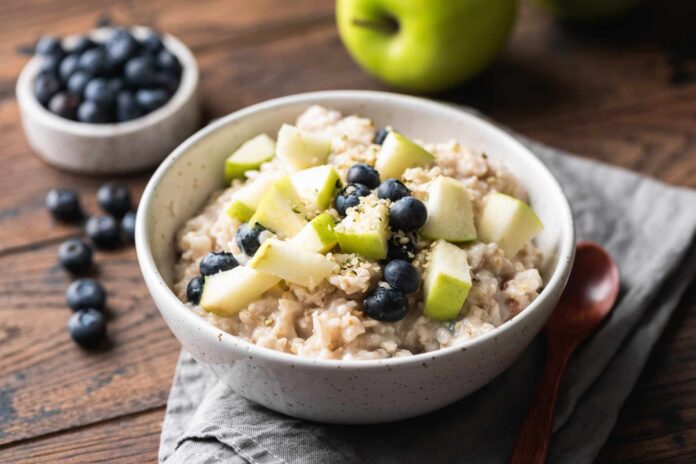Oatmeal, a simple porridge made from oats, is a surprisingly potent health booster. It’s a valuable source of fiber and heart-healthy whole grains, and incorporating it into your diet can have a wide range of positive effects. For those looking to improve their health, regular oatmeal consumption is an accessible and beneficial choice, with potential impacts on everything from blood sugar regulation to immune function.
1. Blood Sugar Management
Oatmeal can be a powerful tool in preventing and managing type 2 diabetes thanks to its impact on blood sugar levels. Beta-glucan, a type of soluble fiber abundant in oats, plays a key role in regulating glucose levels. Studies have shown that consuming oatmeal can significantly reduce blood sugar levels and improve insulin sensitivity – helping your body effectively utilize glucose.
2. Improved Digestive Health and Constipation Relief
Constipation, characterized by infrequent bowel movements and difficulty passing stool, can be alleviated by regularly eating oatmeal. As a source of soluble fiber, oatmeal helps regulate bowel movements, preventing and treating constipation. This fiber absorbs water, forming a gel that slows digestion and increases the bulk and weight of stool, ultimately promoting more frequent and easier bowel movements.
3. Supporting a Healthy Weight
Oatmeal can contribute to weight management due to its high content of whole grains. Whole grains, unlike refined grains, retain both fiber and essential nutrients. The fiber in oatmeal helps you feel fuller for longer, which can reduce snacking and support weight loss efforts. Research demonstrates that people who start their day with oatmeal experience greater fullness and are less likely to snack compared to those who consume oranges.
4. Delivering Essential Micronutrients
Oatmeal is more than just fiber – it provides several important vitamins and minerals, including iron, magnesium, and selenium. Iron is crucial for creating hemoglobin, the protein in red blood cells that carries oxygen throughout the body. Magnesium is vital for nerve and muscle function, while selenium contributes to antioxidant enzyme production, protecting cells from damage.
5. Potential Reduction of Asthma Symptoms
Emerging research suggests that a diet including oats may reduce the prevalence of childhood asthma. Asthma involves the narrowing of airways in the lungs, leading to coughing, shortness of breath, and wheezing. A diet rich in oats alongside fruits, vegetables, nuts, and seeds, coupled with reduced consumption of processed foods, may lessen inflammation that triggers asthma. More research is needed to fully understand this connection.
6. Lowering Heart Disease Risk
Heart disease remains a leading cause of death, and incorporating oatmeal into your diet may significantly reduce this risk. The beta-glucan in oats helps lower blood sugar and total cholesterol levels—both major risk factors for heart disease. Studies following thousands of participants over many years reveal that regular consumption of whole grains, such as oatmeal, is linked to increased HDL (“good”) cholesterol, along with decreased blood sugar, blood pressure, triglycerides, and waist circumference.
7. Providing Antioxidant Protection
Polyphenols found in oats possess potent antioxidant and anti-inflammatory properties. These compounds help defend against oxidative stress, an imbalance between cell-damaging free radicals and the body’s ability to neutralize them. By reducing oxidative stress, polyphenols may protect against various chronic diseases, including heart disease, obesity, stroke, and type 2 diabetes. Beta-glucan also contributes to antioxidant activity, potentially preventing atherosclerosis and neurodegenerative diseases, while promoting healthy digestion and reducing gut inflammation.
8. Supporting a Robust Immune System
Research highlights that beta-glucan supports healthy immune function and improves the activity of immune cells. This robust immune response helps protect the body against harmful pathogens like bacteria and viruses.
Nutrition Information for a Half-Cup of Dry, Quick-Cooking Oats
- Calories: 153.5
- Fat: 2.6 grams (3.3% Daily Value – DV)
- Sodium: 2.4 milligrams (0.1% DV)
- Carbohydrates: 27.4 grams (10% DV)
- Fiber: 4 grams (14% DV)
- Added sugars: 0 grams (0% DV)
- Protein: 5.4 grams (10.7% DV)
Potential Risks and Considerations
While oatmeal is generally safe and healthy, it’s important to be mindful of potential risks:
- Fiber Intake: Rapidly increasing fiber intake can lead to bloating and gas. Gradually incorporate oatmeal into your diet and drink plenty of water.
- Phytic Acid: Oats contain phytic acid, which can hinder the absorption of minerals like iron and zinc. Cooking and soaking oats reduces this effect.
- Added Sugars: Flavored oatmeal varieties often contain high amounts of added sugars, which provide minimal nutritional value.
- American Heart Association (AHA) recommendations : Females and males should limit added sugar intake to 25 grams (6 teaspoons) and 36 grams (9 teaspoons) per day, respectively.
Tips for Enjoying Oatmeal
All varieties of oats—steel-cut, old-fashioned rolled oats—are considered whole grains and offer similar benefits. Choosing an unsweetened variety allows you to control the type and amount of sweetener added.
By regularly incorporating oatmeal into your diet, you can reap the benefits of this simple yet powerful food and contribute to overall health and well-being.
